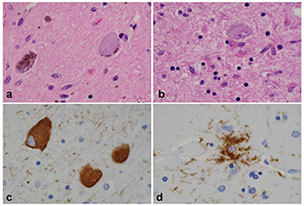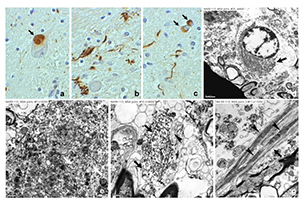Projects
Research in the Neuropathology and Microscopy Lab is targeting breakthroughs in understanding neurological diseases. Families affected by these neurological disorders make this research possible through brain bank donations.
The Mayo Clinic Brain Bank has more than 7,000 specimens. It provides a special resource for investigators engaged in ongoing studies at Mayo Clinic, as well as across the U.S. and Canada and internationally.
Projects include:
Amyotrophic lateral sclerosis (ALS) and frontotemporal degeneration with TDP-43 pathology
More recently, the lab's neuropathologic research has focused on ALS, which also is known as Lou Gehrig's disease, and frontotemporal degeneration with TDP-43 pathology. Transgenic mice that model Alzheimer's disease and other neurodegenerative disorders also are studied as part of efforts to better understand these disorders and develop new treatments.
Einstein Aging Study
The Neuropathology and Microscopy Lab contributes to the Brain Bank Program as part of the Einstein Aging Study.
Disorders in tau pathology
 Progressive supranuclear palsy
Progressive supranuclear palsy
Progressive supranuclear palsy microscopic findings: a. substantia nigra globose NFT; b. subthalamic nucleus gliosis; c. tau-positive NFT; d. tau-positive astrocyte ("tufted astrocyte").
Dr. Dickson has studied disorders with tau pathology in collaboration with Shu-Hui C. Yen, Ph.D., a colleague on Mayo Clinic's Florida campus, for more than two decades.
The major tauopathies studied are:
- Corticobasal degeneration.
- Progressive supranuclear palsy.
- Pick's disease.
- Frontotemporal dementia linked to tau mutations.
Many such cases are obtained through the CurePSP Brain Bank on Mayo Clinic's Florida campus, which Dr. Dickson also supervises.
Genetic studies
 Multiple system atrophy
Multiple system atrophy
Multiple system atrophy microscopic findings: a. neuronal inclusion; b. neuritic processes; c. GCI and neurites; d. GCI; e., f., and g. neurites.
These studies comprise an increasingly important aspect of neuropathologic research as new genes and genetic risk factors are discovered for Alzheimer's disease and other major neurodegenerative disorders.
Mayo Clinic collaborators perform genetic studies on brain-derived DNA. These collaborators include:
Investigators at other institutions also perform studies.